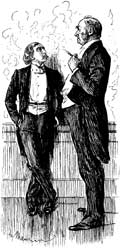George Speak
I looked at the word “advocate” this morning and flashed on the contextual issues… the pronunciation shifts from long A to short A depending on whether it is being used as a verb or a noun. If you hear the spoken word you will know whether it is a noun or a verb. If you see it on a page or in pixels, context will drive your understanding. But if you are a Texas boy, bred to privilege and unspoiled by instruction, you will need to clarificate the situation with your speech writers. Specifically, there is no reason for a nuanced vowel shift in the use of a perfectly good word. What are we, Chinese? No. What’s called for here is a mid-Texas chopped A, a long vowel, but not drawn out as if a person’s people were some kinda scandinavians. “Advocate” is a power word - three syllables! - that someone might stick in a speech and you’d have to pronunciate it while you were deliverin’. It is a verb and there is no room for subtle distinction or shading of meaning based on pronunciation and context. The verb is “advocate” (ad-v&-kAt). The noun is “advocator” (ad-v&-kA-t&r). There’s no room for nancy nuance here… “advaKATE - advaKATER,” that’s just how it is. And don’t confuse me with yer liberal health food advocados.


